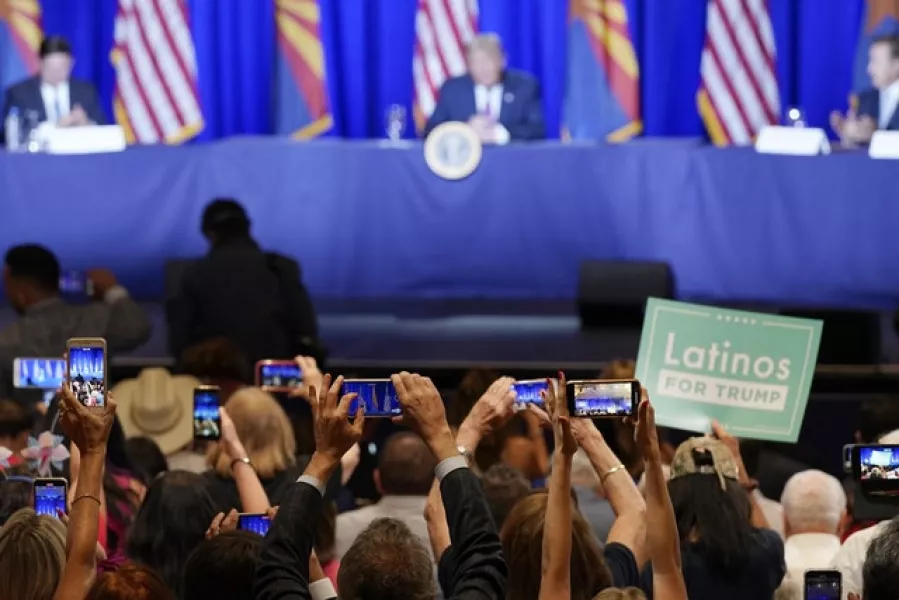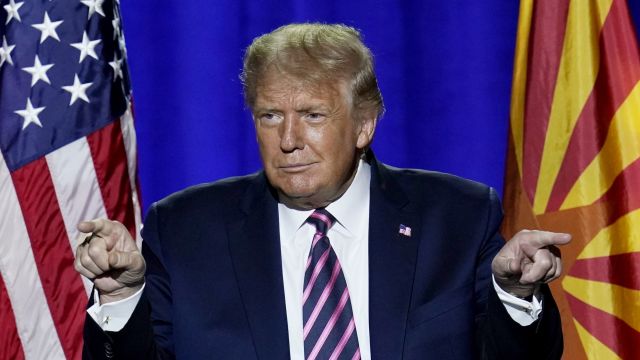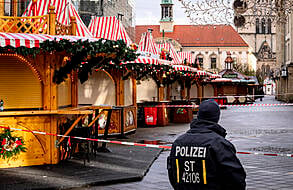Democratic governors and local leaders have urged the president to reconsider the events, warning he is putting lives at risk.
But they have largely not tried to block the gatherings of thousands of people, which Mr Trump and his team deem “peaceful protests” protected by the First Amendment.

“If you can join tens of thousands of people protesting in the streets, gamble in a casino, or burn down small businesses in riots, you can gather peacefully under the 1st Amendment to hear from the President of the United States,” Tim Murtaugh, a Trump campaign spokesperson, said in a statement.
Mr Trump’s refusal to abide by health guidelines — even those crafted by his own administration — underscores the extent to which he believes projecting an image of normality is vital to winning in November, even as the country approaches 200,000 deaths from Covid-19.
Mr Trump has tried to use this summer’s mass protests over racial injustice and police misconduct as cover for his rallies, making the case that, if demonstrators can gather en masse, so can his supporters.
So far, Democratic governors have declined to stand in his way, refusing to become a foil to Mr Trump and feed into his narrative that liberals are trying to deny Republicans their First Amendment rights.
Mr Trump’s campaign has insisted it takes appropriate health precautions, including handing out masks and hand sanitiser and checking the temperatures of rally attendees.
But images of thousands of maskless supporters standing shoulder to shoulder remain jarring in a country where sports are still played in empty arenas and concerts have been largely banned.

That is especially true for those who have lost loved ones or spent months isolating at home and worry that rallies will further spread infection, undermining hard-fought progress.
An indoor rally Mr Trump held in Tulsa, Oklahoma, in June was blamed for a surge of virus infections there.
Mr Trump held an indoor rally at an industrial warehouse in Henderson, on the outskirts of Las Vegas, on Sunday night.
The state of Nevada restricts gatherings to 50 people — based on White House reopening guidelines — but thousands of supporters packed in nonetheless. Relatively few people wore masks.
“This is an insult to every Nevadan who has followed the directives, made sacrifices, and put their neighbours before themselves,” said Nevada’s Democrat governor Steve Sisolak.
The city of Henderson on Monday announced it was fining the warehouse owner, Xtreme Manufacturing, $3,000.

Mr Sisolak slammed the rally as “shameful, dangerous and irresponsible” but it does not appear the governor would try to prevent a replay.
In some other states, the rallies are legal.
In North Carolina, an order signed by Democratic governor Roy Cooper limits outdoor gatherings to 50 people and mandates masks in public, but “activities constituting the exercise of First Amendment rights” are exempt.
The state’s top public health official, Mandy Cohen, played down calls for stricter enforcement last week as she criticised Mr Trump for holding a rally at the Winston-Salem airport, where thousands of supporters crammed together without masks.
In Michigan, political speech is exempt from Democratic governor Gretchen Whitmer’s order limiting the size of outdoor gatherings.
And while Ms Whitmer’s office issued a memo saying people engaging in First Amendment activities still must adhere to social distancing measures, the state has not moved to enforce the rules at Mr Trump’s rallies or during protests.
“We hope the president would care enough about his supporters and their friends and families that he would encourage social distancing and mask wearing,” said Ryan Jarvi, a spokesperson for Democratic attorney general Dana Nessel.

Nevada is one state where Mr Trump has encountered resistance.
His campaign had originally planned to hold a pair of rallies over the weekend in within the Las Vegas city limits and in Reno, but those plans were scuttled after the Reno-Tahoe Airport Authority warned one of the hosts that the rally would violate the governor’s restrictions and the terms of the company’s lease.
Mr Trump’s campaign immediately moved to blame Mr Sisolak for the pushback, but the governor’s office insisted it had had no involvement.
Mr Trump said in an interview on Sunday he did not believe he was subject to the order, and blamed Mr Sisolak for forcing him to abandon plans for the outdoors rallies.
“They cancelled six different sites because the governor wouldn’t let it happen, all external sites,” the president said.
Mr Trump on Monday again drew hundreds of supporters to an indoor event in Phoenix that his campaign advertised as a “Latinos for Trump round table,” thus limiting scrutiny. But that had the feel of something different.
“This is supposed to be a roundtable, but it looks like a rally,” Mr Trump told the crowd.







